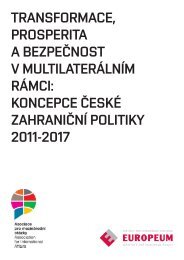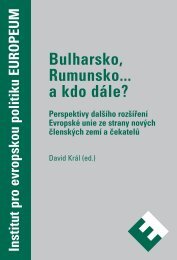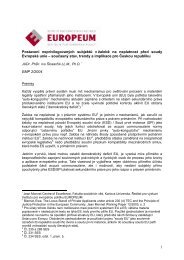eu constitutionalisation - EUROPEUM Institute for European Policy
eu constitutionalisation - EUROPEUM Institute for European Policy
eu constitutionalisation - EUROPEUM Institute for European Policy
You also want an ePaper? Increase the reach of your titles
YUMPU automatically turns print PDFs into web optimized ePapers that Google loves.
Chapter 2: The Convention and IGC Texts of the Constitutionsuch a big commission would have compromise the collegiality of thisorgan and would have fragmented even more the division of the portfolios.The IGC there<strong>for</strong>e introduced a commission composed by a numberof a two-third of the number of member states following a principle ofequal rotation. This system was to enter into <strong>for</strong>ce in 2014 thus keepingthe Nice system still alive <strong>for</strong> a decade, with the risk of paralysing thefunctioning of the body. Another setback is the limitation of the Presidentof the Commission in appointing the commissioners as the IGC scrappedthe provision in which, according to the Convention draft, was <strong>for</strong>eseenthat the each member states had to present a list of three candidates fromwhich the president would have been chosen.The seats of the EP were also raised to the number of 750 increasing the minimumthreshold to six representatives and limiting the maximum number to96 in order to equilibrate the modification of the double-majority system.The Convention <strong>for</strong>mula of team Council presidencies, with the possibilityof different countries presiding different council <strong>for</strong>mation at the same time,was only nominally maintained. The IGC, following the Seville <strong>European</strong>Council conclusion, restored indirectly the system of six months presidencyalthough the country holding the presidency will be assisted by the othertwo in the team on the basis of a common programme.The case of policiesThe variation of the texts it includes also some relevant changes in the areaof policies having a certain high political salience and relevance as in thecase of the enhanced and structured cooperation. The IGC tried to limitthe effect of the Convention text in CFSP and CSDP area by changing theprocedure to authorise an enhanced cooperation in these domains and thuspassing to unanimity. A further limit is represented from the fact that thecouncil cannot resort the passerelle clause of the Art. IV-444 as it is excludedfrom the issues areas having military and defence implications.Major changes were conducted in the economic governance area, lesseningthe coordination of economic policies but increasing on the other sidethe decisional autonomy of the Euro zone members. In fact the IGC wentfurther that the Convention in recognising the <strong>for</strong>mal existence of theEuro group, <strong>for</strong> example suspending the vote of the “outs” in the recommendationmade to the Euro zone members within the framework of theChapter 2: The Convention and IGC Texts of the ConstitutionBroad Economic <strong>Policy</strong> Guidelines. This will entails that only member ofthe Euro zone will be entitled to vote on the decision to address early warning<strong>for</strong> the member states economic policy or excessive deficit. This can beconsidered as a progress to rein<strong>for</strong>ce the decision making capacity of theEuro group. The IGC maintained the power of the Commission to submitproposals – which can be amended only by unanimity of the Council – asfar as the decision on whether the deficit exists, is concerned. Howeverthe IGC has returned to the status quo ante with regard to the correctivemeasures to be taken from the member state in question; the decision infact will be taken on the basis of a recommendation of the Commissionthat can be changed from the Council without unanimity.The budget has proven to be a sensitive issue during the IGC, showingsome setbacks in relation to the own resources and the multi-annualfinancialframework. Despite the recommendation of the discussion groupspecifically set by the Convention on the budget procedure and the ownresources system, the IGC has modified some important rules virtuallyclosing the door to a lighter and easier modification of the own resourcessystem. In fact the <strong>European</strong> law establishing the provisions related to thesystem of the own resources will be still adopted by unanimity withoutthe abolition of the national ratification. Qualified majority will applyonly <strong>for</strong> the law laying down the implementing measures. The Conventiondraft modified also the adoption of the multi-annual-financial frameworkby QMV system and thus avoiding the national ratification. The IGC onthe contrary restored the unanimity even though there is a possibility tochange the procedure adopting the “passerelle clause” (that is quite frozenby the need of approval by all the parliaments). Last but not least, theConvention deleted the distinction between compulsory and non-compulsoryexpenditure in order to fully involve the <strong>European</strong> Parliament inthe definition of the <strong>European</strong> Union budget. On the other side the IGCaltered the compromise of the Convention in favour of the Council as inthe conciliatory committee stage, the Council will have the right to refusethe amendments put <strong>for</strong>ward by the Parliament and can directly ask theCommission to <strong>for</strong>mulate another proposal.In other two policy areas (police and judicial cooperation in criminal mattersand social policy) it is possible to outline quite important changes inrelation to the Convention given to the pressure of some member states’governments. This is the case in which the IGC inserted a special mecha-68 69








